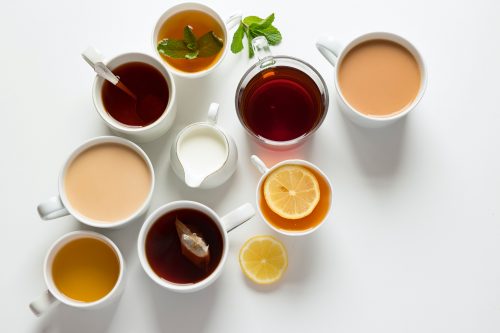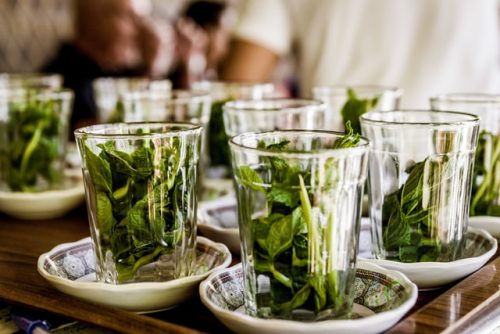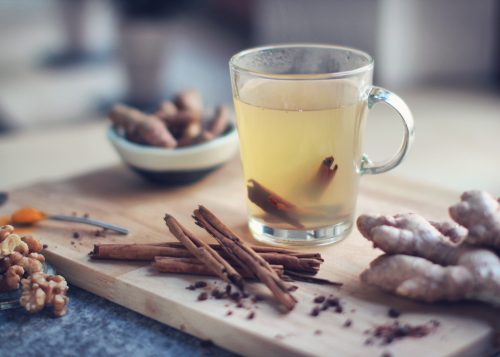Herbal teas have been around for hundreds of years. Many of them have been used as holistic remedies, thanks to their many health benefits. Let’s take a closer look at how herbal teas are derived and the 10 best herbal teas for you to try out.
What Are Herbal Teas?

You might be surprised to learn that herbal teas aren’t actually considered true “teas.” True teas are brewed from the leaves of the Camellia sinensis plant. Some true teas include oolong tea, green tea, and black tea.
What sets herbal teas apart from true teas is that they’re made from dried flowers, spices, fruits, or herbs. This makes for unique flavor profiles, with many being sweeter or lighter in flavor. For many people, this makes herbal teas easier to drink.
What are the Benefits of Herbal Teas?
In general, there are some health benefits that can be found among most herbal teas. The majority of herbal teas are a great source of antioxidants, meaning they might help protect us against cancer. They also mostly tend to offer anti-inflammatory benefits, making them ideal for anyone who’s suffering for autoimmune diseases.
That being said, each herbal tea is known for its own specific set of benefits.
Try Out These Top 10 Herbal Teas
If you’re looking to try herbal teas, you might want to consider checking out these 10.
1. Chamomile Tea
With its apple, honey-like favor, this is one of the most well-known herbal teas — and for good reason. Known for its calming benefits, chamomile tea is a popular option amongst tea drinkers who want to destress and sleep better at night.
2. Echinacea Tea
Peppermint tea has a fresh, minty flavor that may taste sweet to some. Known for its ability to help relieve digestive issues, such as upset stomach and nausea, this tea is a favorite among those suffering from conditions like IBS.
Derived from the echinacea plant (or more widely known as the coneflower), this tea is known to have a very strong floral flavor that can leave your lips tingling. Most people prefer to drink it with a mixture of other herbs to soften the flavor.
Echinacea tea is often said to help ward off the common cold. Though research on the tea’s ability to truly shorten the duration of colds is weak, echinacea has been proven to increase white blood cell counts.
3. Peppermint Tea

Peppermint tea has a fresh, minty flavor that may taste sweet to some. Known for its ability to help relieve digestive issues, such as upset stomach and nausea, this tea is a favorite among those suffering from conditions like IBS.
In addition to alleviating stomach discomfort, the tea also has been proven to work as a breath freshener. Some research found it can reduce halitosis in just one month’s time. It also could potentially help relieve headaches and migraines.
4. Dandelion Tea
With its roasted flavor that may remind some of chocolate, dandelion tea is often considered to be the best caffeine-free alternative to coffee. The tea is packed with vitamins and nutrients, with potassium making the top of the list.
This tea has been found to act as a diuretic. It may help reduce water weight and bloating. Thanks to the polysaccharides it contains, dandelion tea has also been found to improve liver function by helping the organ better remove wastes and toxins.
5. Hibiscus Tea
Derived from the flowers of the tropical hibiscus plant, this tea is known for its pink flavor and tart taste.
Hibiscus tea has been found to be a heart-healthy tea. It could potentially lower blood pressure and blood fat levels. Research has linked it to improved cholesterol and triglyceride levels.
A few small studies have also linked this tea to weight loss.
You can enjoy this one hot or cold!
6. Sage Tea
Made from infusing hot water with sage, this tea is known for its subtle, earthy flavor. Sage is widely used in dentistry, since it’s known to promote good oral health. It has antibacterial properties that may help reduce bad breath and gingivitis, as well as improve mouth sores. Sage tea is also believed to help boost mood, improve brain function, and regulate diabetes.
7. Lemongrass Tea
Derived from the tall, stalky lemongrass plant, which is also known as citronella, this tea is known for its citrusy, minty flavor.
Lemongrass tea is believed to offer calming effects. It’s been long used to help improve sleep and reduce stress.
Other potential benefits of lemongrass tea include diuretic effects, improved blood pressure readings, reduced cholesterol levels, and weight loss.
8. Ginger Tea
Made by infusing ginger in hot water, this tea is known for its warm, slightly spicy flavor.
Ginger tea is known to offer numerous health benefits. It’s commonly used for alleviating upset stomachs and nausea, as well as headaches and migraines. It’s believed to help lower blood pressure and potentially aid in weight loss.
9. Rosehip Tea
Known for its sweet, yet tarty floral flavor, this tea is derived from the rose plant.
One of the main benefits of rosehip tea is its high Vitamin C content, which can help boost immunity. It’s also believed to help reduce blood glucose levels and aid in weight loss due to an antioxidant it contains called tiliroside. Rosehip tea may also help keep us looking youthful, since it helps boost collagen and protects our skin from free radicals that cause sun damage.
10. Cinnamon Tea

With its light sweet and spicy flavor, this tea is derived from the bark of cinnamon trees. Cinnamon tea has been linked to improved blood glucose levels, making it beneficial for diabetics. It may also help improve heart health and alleviate PMS symptoms.
These are just 10 of the best herbal teas to try out. No matter what type of flavor you’re looking for, there’s an herbal tea out there that will suit your needs. Which one is your favorite?